Is your cat always trying to chew the electrical cords? Unfortunately, this is not a behavior issue you want to ignore. It’s time to do something about this bad habit that could end in severe injury. We will show you eight ways to get cats to stop chewing on cords, but first, you must determine the root cause of this behavior.
Besides the fact that your cat could get hurt by chewing on cords, it’s also not cheap to keep purchasing more. However, there are methods to stop them from chewing on electrical wiring which would be covered in this article.
Why Cats Chew Cords
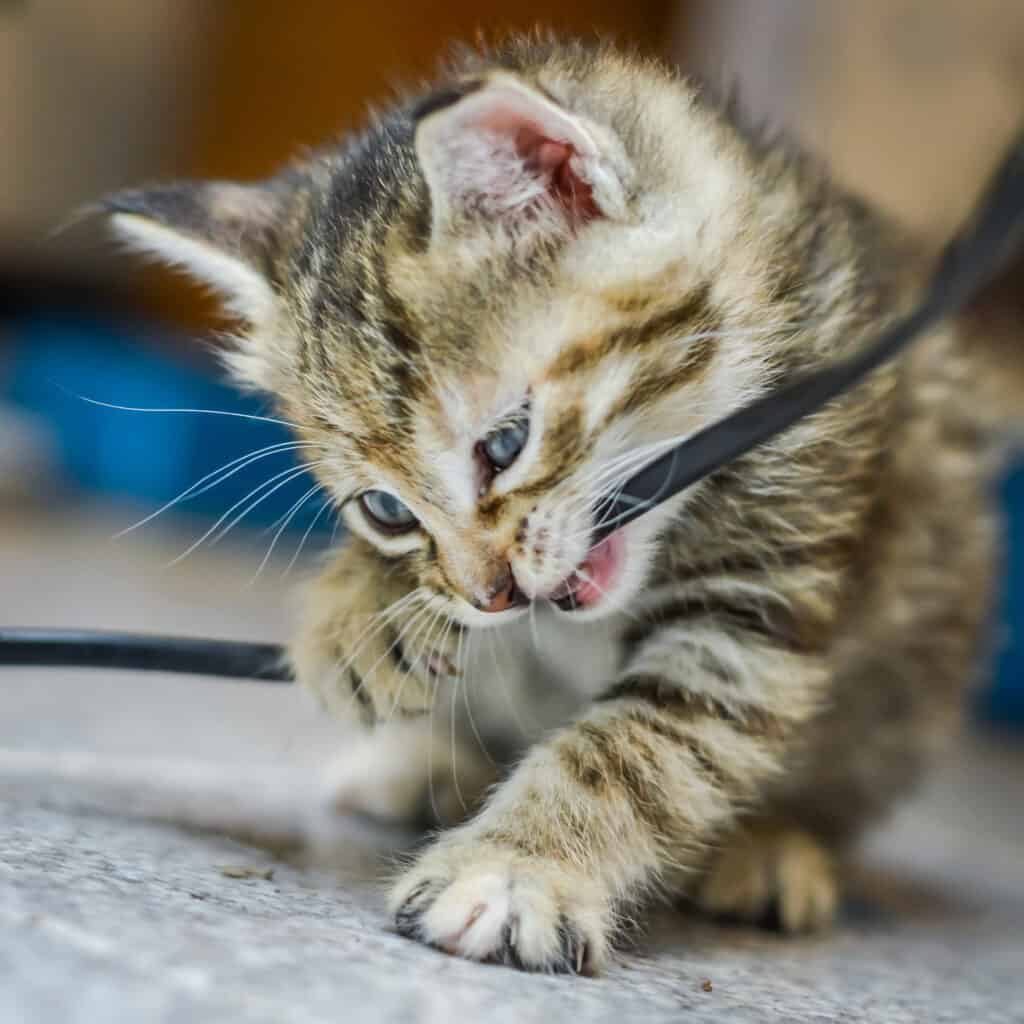
There are many possible reasons why your cat likes to chew on electrical cords.
©iStock.com/1320296697
It’s hard to determine why cats are attracted to electrical cords and choose to chew on them. But, some people believe it’s just their playful nature and urge to attack anything that looks like a string or ribbon.
In addition, their curious natures usually get the better of them and sometimes land them in hot water. But this is only one theory, and other reasons for chewing on chords include:
Boredom or Inactivity
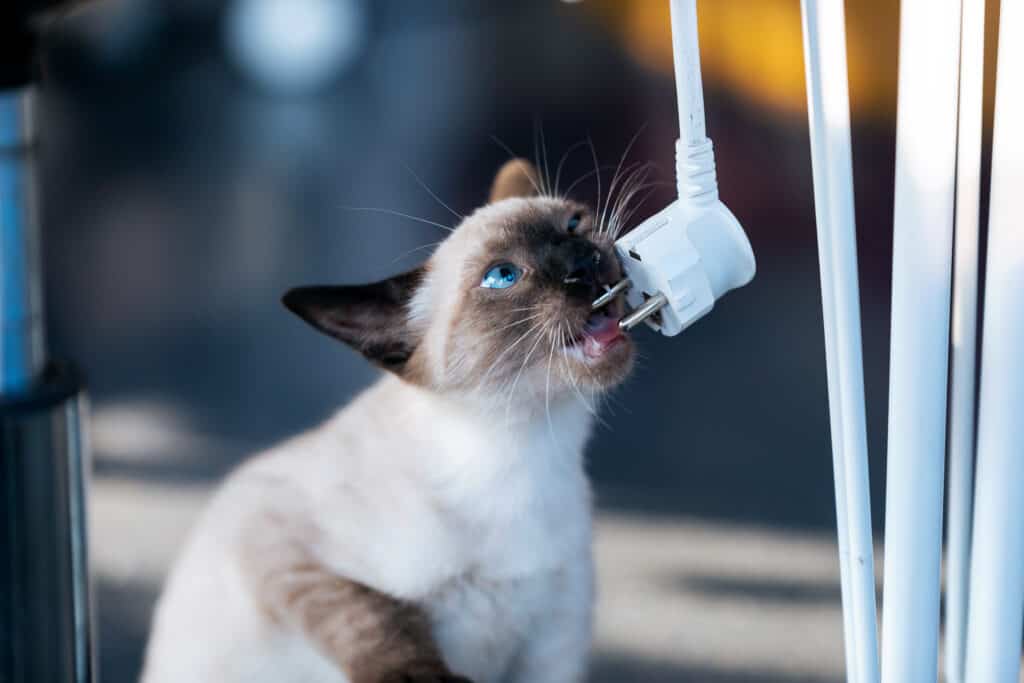
Some cats chew cords because they are bored, want to play, or need attention.
©iStock.com/nensuria
If your cat is a high-energy breed, boredom is most likely the root cause behind why it is chewing on cords. Active cats need mental and physical stimulation, and if they don’t find a way to get rid of their excess energy, they act out in destructive behaviors like chewing, scratching, and urinating in the home.
Inactivity due to an injury or old age is also a factor. For example, older felines are prone to osteoarthritis, which hinders their activity levels. When a cat is restricted from exercise or moving around, it can get stressed, which leads to bad habits like chewing.
Pica
This is a rare possibility, but some felines suffer from a nutritional deficiency called pica, which sometimes causes cats to eat weird materials.
Some scientists believe that cats instinctively determine when a nutrient is missing from their diet. However, pica makes them choose odd items that are often inedible and serve no nutritional value. Interestingly, most cats who suddenly start eating strange materials are usually found to be anemic.
Obsessive-Compulsive Disorder
It might be hard to get cats to stop chewing on cords if they have OCD (Obsessive-Compulsive Disorder) because this disease can only be managed but not cured. OCD is common in breeds like the Siamese and Burmese cats, and they typically get the urge to chew, eat, and suck inedible items.
If you are not sure that OCD is the cause of chewing, have a lookout for other symptoms of this illness before ruling it out. These include:
- Overgrooming: When cats lick a specific spot on their bodies with so much force, the hair starts to fall out, and bald patches appear.
- Self-mutilation: This behavior is primarily reserved for the tail. For example, repetitive tail chasing is one of the first signs of OCD in cats.
- Feline hyperesthesia: This disease causes involuntary muscle contractions, and symptoms include rippling of the skin, fatigue, and pain or discomfort when touched.
- Obsessive behavior: Obsessive licking, chewing, or sucking on fabric, also referred to as wool sucking. There are numerous opinions about why cats do this, and some theories suggest that being removed from their mothers at a young age is the most significant cause.
Stress
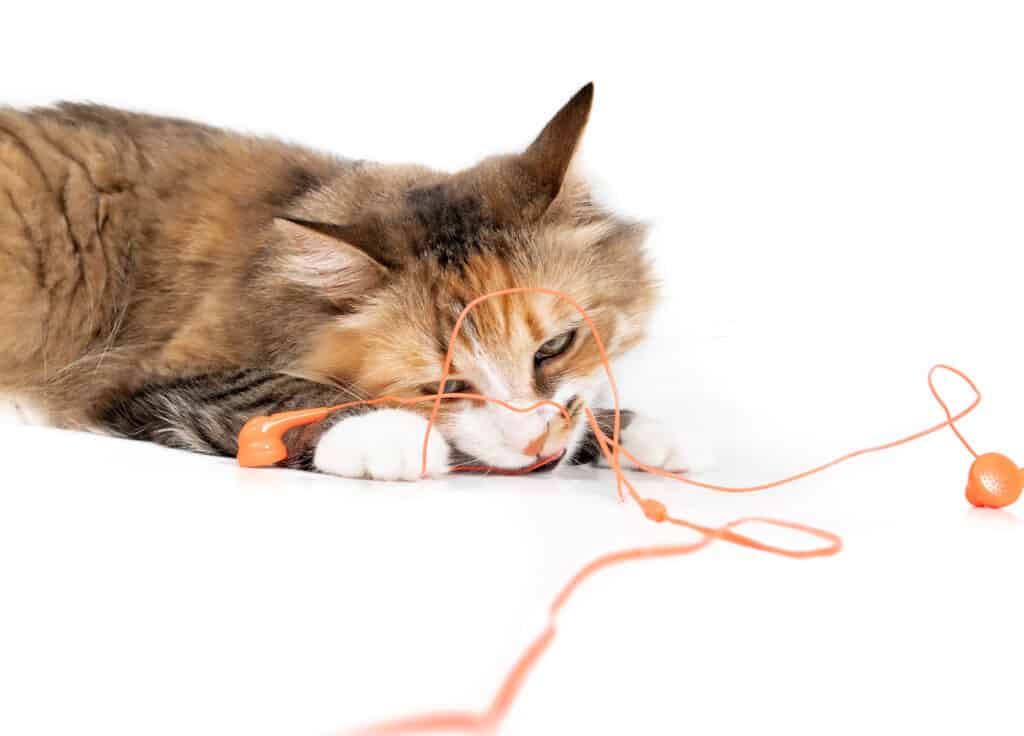
Be careful leaving cords and headphones out if you have a cat who likes to chew cords.
©iStock.com/Petra Richli
Stress is a common factor amongst cats and can cause strange behavior. Unfortunately, chewing is one of the cats coping mechanisms, making them feel better emotionally.
Dental Issues
When cats have dental issues, they might chew on hard things, like cords, to get rid of the pain or discomfort. Dental diseases are quite common in cats; between 50 to 90% of older cats develop some sort of dental issue throughout their lives.
Therefore, you must take your furry feline to the vet often for dental checkups and care. If your cat allows you, try to brush its teeth at least three times a week as a preventative measure.
Medical Issues
Unfortunately, It might be challenging to get your cat to stop chewing on cords if they have a medical condition. Also, when cats get older, they are prone to metabolic issues like hyperthyroidism, which causes their activity levels to surge and increase their urge to chew when they can’t exercise.
However, there is a solution: take your furry friend for a blood screening panel. This might reveal the cause of their behavior, and there might be a way to cure them.
Injuries Cats Can Sustain From Chewing on Cords
You must stop your cat from chewing on chords because they can get electrocuted, which may lead to heart or lung damage. Strangely enough, cats under the age of two are the most likely to receive electrical burns.
Other signs that your cat is chewing on cords include:
- Constant drooling
- Burn marks around their snout
- Coughing
- Difficulty breathing
- Not eating
- Decrease in energy
Prevention: Eight Ways to Get Cats to Stop Chewing on Cords
Depending on the root cause of chewing, there are ways to try and curb this nasty habit. These include:
1. Give it Time
If your cat is still relatively young, this could just be a playful phase as they are getting used to their environment. Give it a few months and see if there is any change in their behavior.
2. Change their Diet
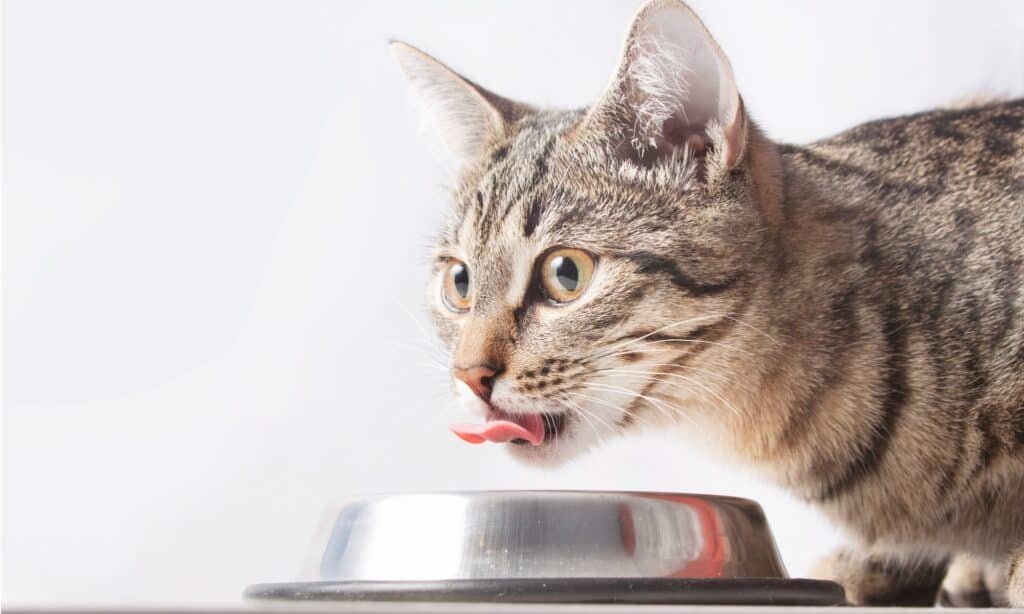
Sometimes getting your cat to stop chewing cords may be as simple as changing up their diet.
©iStock.com/Ukususha
This option is mainly for adopted cats that have recently been rescued. Their chewing could be a result of inadequate nutrition. However, even low-quality foods provide the proper nutrition to curb any deficiencies, so if this is the problem, it’s likely your poor feline hasn’t eaten properly in a while.
Supplement your cat’s diet with high-quality meals containing real chicken or turkey, or even better, boil a chicken fillet in some water and shred it up.
3. Keep Your Cat Active
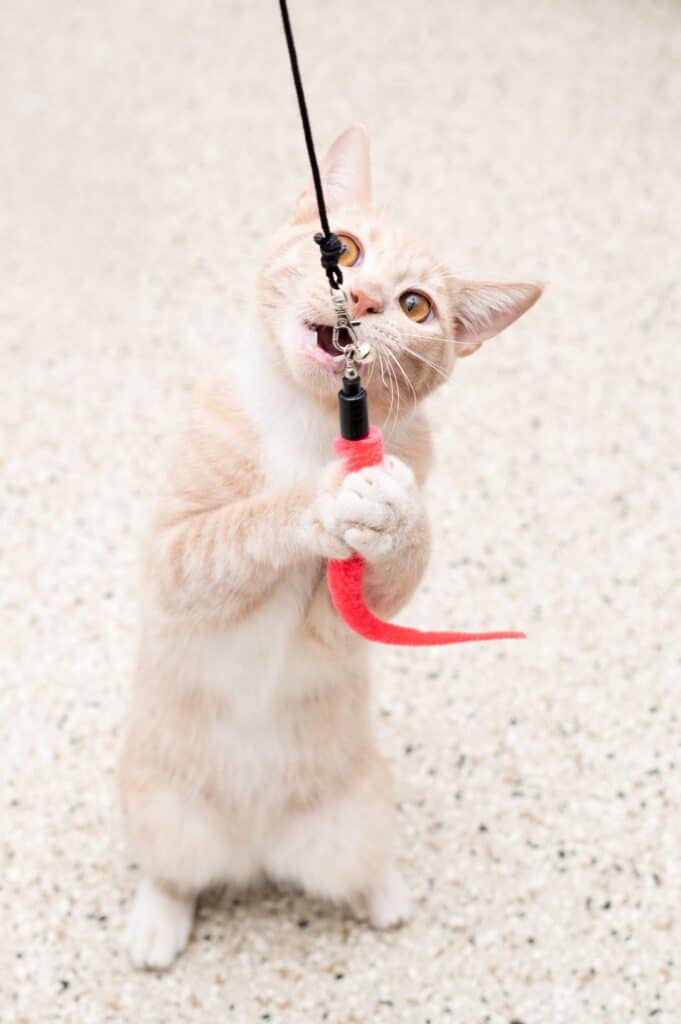
If your cat likes chewing on cords, you can try giving them more play time!
©Casey Elise Christopher/Shutterstock.com
Boredom is a serious cause of chewing, so ensure your cat is getting enough exercise to keep them healthy and happy. For example, a 20-minute daily play session would do wonders for your cat’s mental and physical well-being.
4. Eliminate Stressful Situations
There are several things that can cause your kitty to stress. For example, dogs barking, rambunctious children, loud noises, other cats (especially males), and yelling. Try eliminating these factors one by one and see if there is any change in behavior.
5. Wrap Cords in Aluminum Foil
Cats are not the biggest fans of aluminum foil and won’t attempt to chew on it. That’s why wrapping your cords in aluminum foil is a great idea. However, it might make your cords look messy and out of place, but who cares? It’s peace of mind you are after.
6. Spray Menthol Scents on Your Chords
It’s a known fact that cats hate menthol, so it’s the perfect substance to use on your cords to keep them at bay. It doesn’t need to be the spray; you can rub substances onto the wiring, like Vicks Vapor Rub.
Generally, you don’t need to smear the entire cord for this scent to take effect; just a little on each end will do the trick.
However, there are some problems with this option: it might deter the cat from entering a larger area of the home, and using Vicks will attract dust and become extremely dirty over time.
7. Invest in Wire Covers
While this is not really a solution, it’s more of a way to hide the problem. Wire covers organize and contain cords, making them appear neater or hiding them completely. In addition, it provides a shield that will hopefully deter your feline friend.
However, cats can still chew through these covers, so they will need to be replaced frequently, which can be costly.
8. Ask Your Local Vet
If you have tried all these suggestions, and your cat is still chewing on chords, it might be time to take them to your trusted veterinarian. If they suffer from OCD or Pica, they need treatment to live a long and happy life.
Luckily, most cats outgrow their chewing phase, but some will continue. Generally, aluminum foil is the best way to get cats to stop chewing cords, and it’s effective and easier than spending hours installing wire covers and cleaning up the mess Vicks leaves behind.
Cat Breeds Most Likely to Chew Cords
While most cat breeds are playful, especially kittens, certain breeds are more likely to chew cords. These include:
Siamese
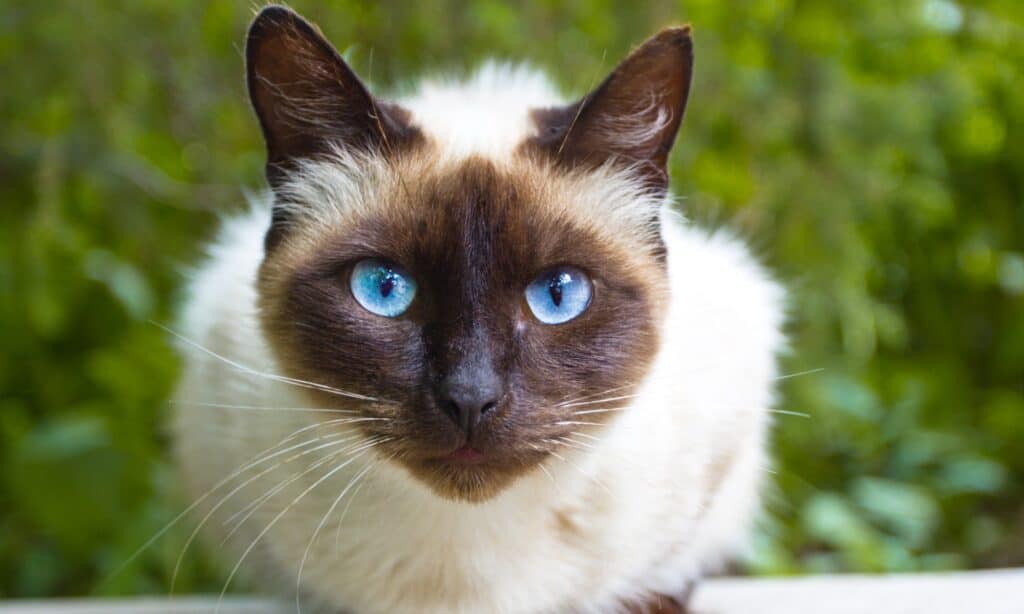
Siamese cats are friendly and affectionate, but they can get into trouble if they are bored or feel neglected.
©iStock.com/chromatos
The Siamese cat is one underrated feline! While these cats are beautiful to look at, not many people know they are highly intelligent, friendly, and like to chat with their owners. They are also affectionate, to the point of being dog-like. However, these dog-like similarities extend to other aspects of their personalities, like being mischievous, playful, and destructive.
Siamese cats don’t like being left alone and could start chewing cords as a way of acting out or because they are stressed due to separation anxiety.
Maine Coon
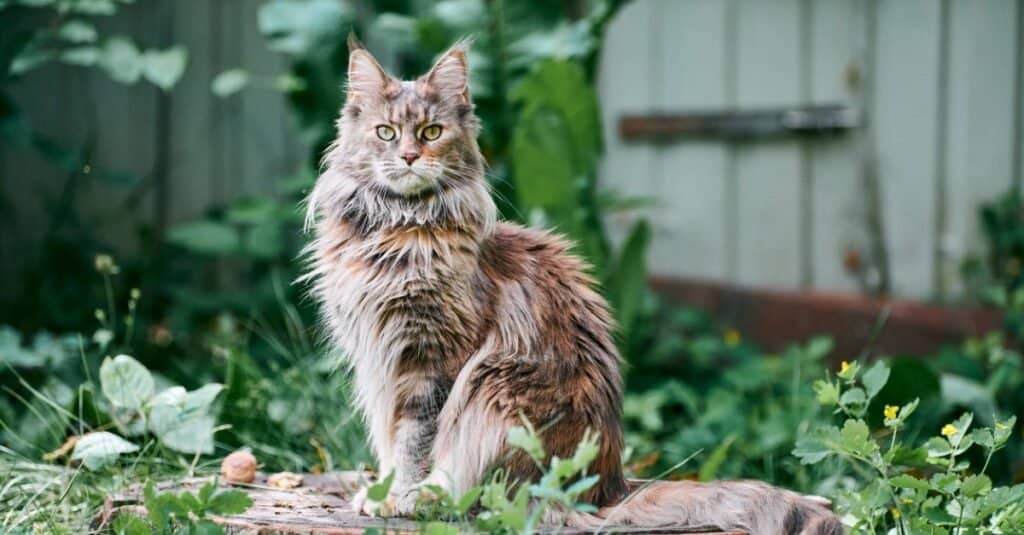
The Maine coon cat is quite a majestic sight as the largest domestic cat breed.
©iStock.com/TRAVELARIUM
Maine Coons are very popular because of their massive size and gentle nature. Just like the Siamese, these cats are often compared to dogs because of their affectionate personalities.
But they have one cat-like trait, and that’s their curiosity. Maine Coons will follow their owners around all day just to see what they are doing.
While this all sounds like fun and games, it can lead to serious separation anxiety issues and cause your fluff ball a lot of stress and anxiety. They might start acting out by chewing, scratching, or becoming more vocal to deal with their stress.
Persian
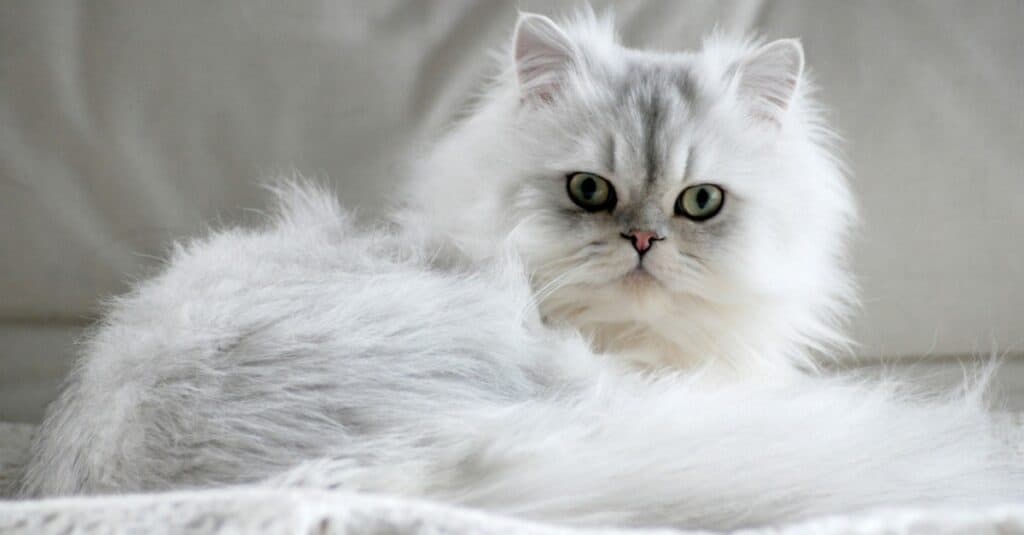
Persian cats are beautiful, but they require a lot of attention to keep them happy and healthy.
©iStock.com/Olivia7
Many people love Persians because of their loving nature. However, they are not suitable pets for people who are never home. These cats need a lot of attention; if they don’t get it, they’ll have no problem letting you know.
In addition, when they are kittens, they enjoy rough play, and if you indulge in this behavior, it may lead to excessive biting and chewing as adults.
That’s why Persians are more prone to chewing cords than other cat breeds. So, they are best suited to owners who spend most of their day at home and can give them constant attention.
Ragdoll
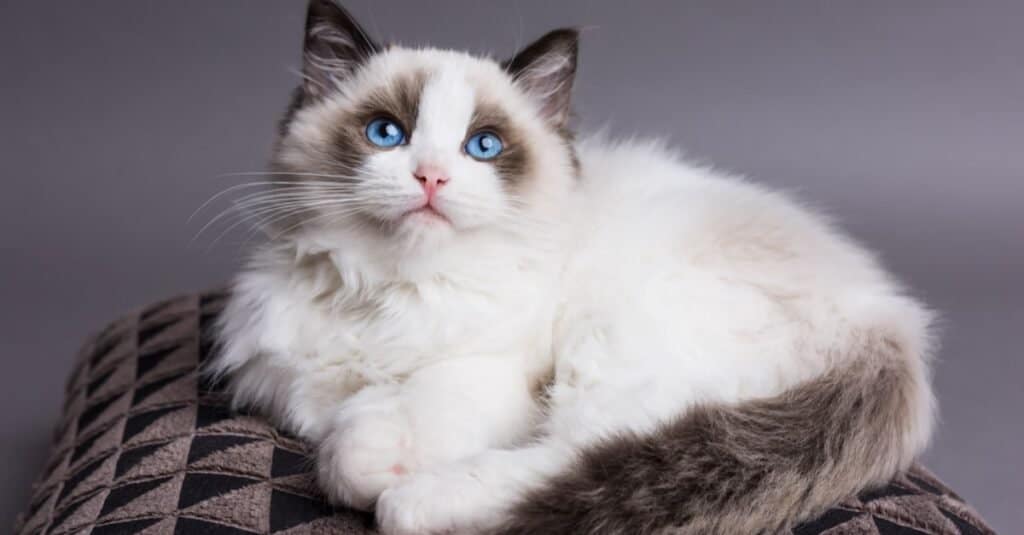
The Ragdoll name is derived from the tendency of individuals from the original breeding stock to go limp and relaxed when picked up.
©madeinitaly4k/Shutterstock.com
Ragdolls are part Persian and have very similar characteristics. They are energetic, playful, and extremely curious. But, on the other hand, they are known for being mischievous and often get into situations they shouldn’t.
However, their intelligence is notorious, and they are eager to please, making ragdolls easy to train. When someone’s at the door, these cats will usually run to meet them, much like a dog.
Their social personalities make them prone to separation anxiety, and they may turn to chewing on cords to deal with their stress. However, getting another cat or dog for companionship should help if you can’t be home all the time.
Bengal
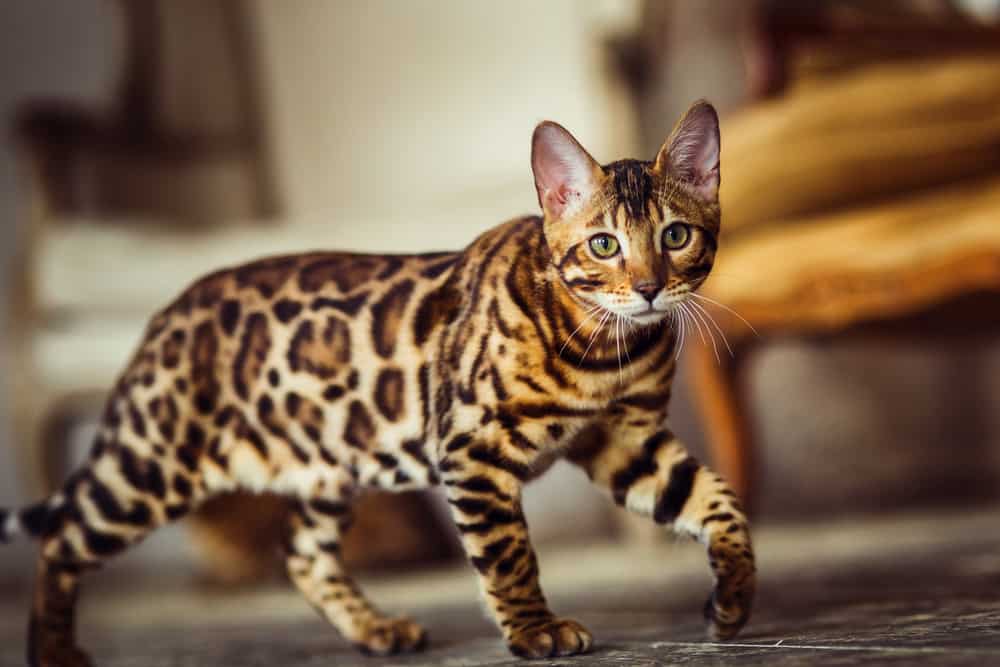
The Bengal cat is a highly intelligent breed characterized by its wild,
leopard
-like appearance.
© Alexander_Evgenyevich/Shutterstock.com
Bengals still have a wild side, thanks to their Asian leopard cat genes. But they also inherit many traits from their domestic cat genes, making them playful, vocal, and affectionate. However, they need a lot of attention, especially if they are the only pet in the home.
Having additional pets will help their constant need for attention, but they still need love from their owners as well. If Bengals don’t get the attention they think they deserve, destructive behavior can emerge. They can show their displeasure by chewing, scratching, vocalizing, and urinating inside the home.
Russian Blue
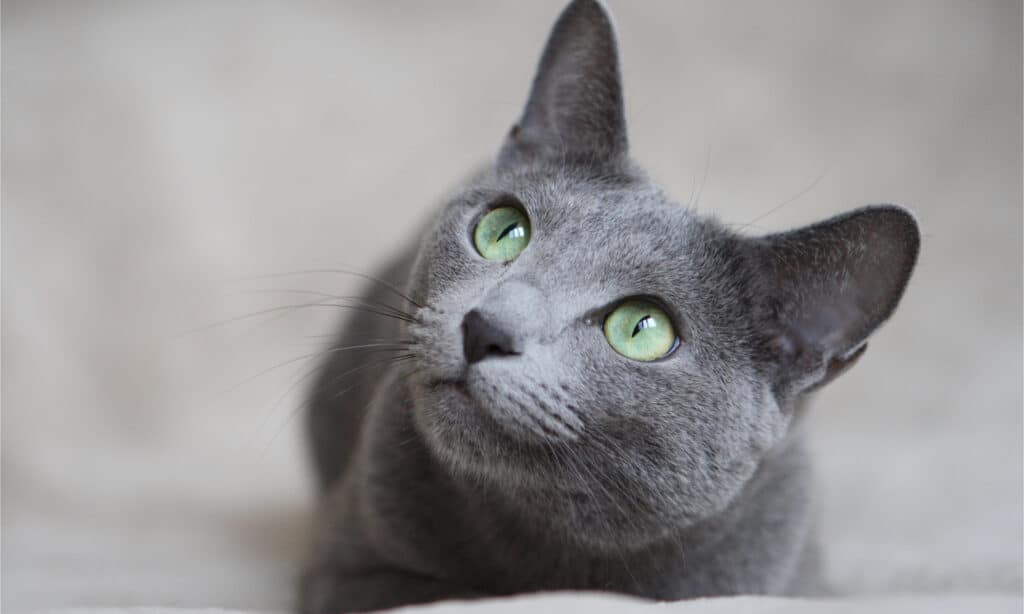
The Russian blue is known for its blue-grey fur and alert expression.
©Bildagentur Zoonar GmbH/Shutterstock.com
The Russian blue is a very devoted pet and usually attaches itself to one person in the household. However, it will take attention from anyone who’s willing and demands more! They will follow their owner wherever they go and will expect the same devotion in return.
While they can entertain themselves, if you don’t give them enough attention, they will begin to feel neglected and act up. In addition, they can become quite destructive when frustrated; they mostly scratch but are also known to chew.
One way to avoid this is by spending more time with your furry friend and providing them with fun toys when you have to go out. Alternatively, you can hire a pet sitter when you are not home, but if this seems too rich for your blood, a trip to the vet might help get you to the bottom of things.
Siberian
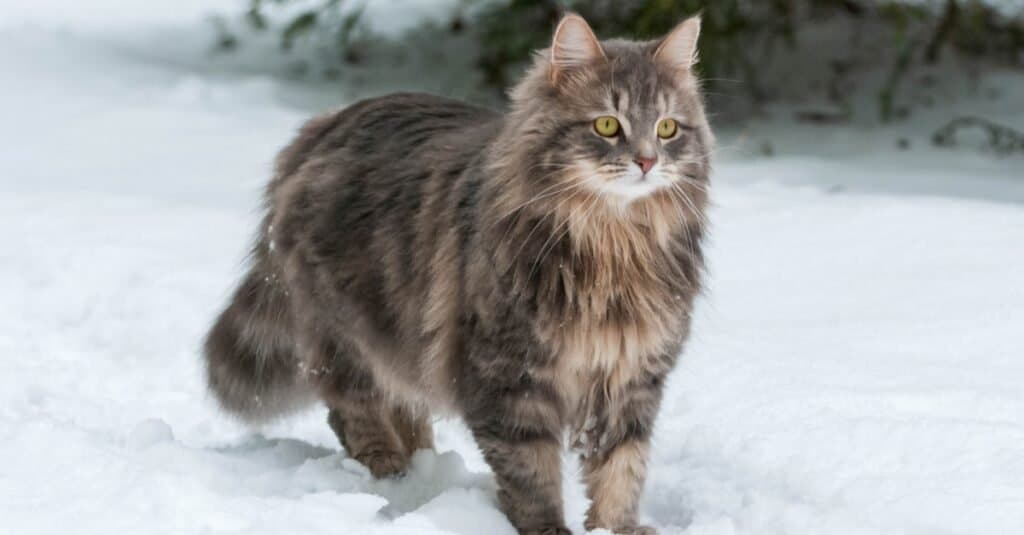
Siberian
cats have long bodies that are strong and powerful.
©Emil Helge/Shutterstock.com
Siberian cats adore children thanks to their loving, gentle, and laid-back personalities. These traits also give them the ability to adapt to any situation without a fuss. It also makes them extremely loyal companions.
Cats typically chew all types of objects when they are teething, but this behavior should stop once all their permanent teeth have arrived. However, Siberians are known to continue this behavior, and it could be due to several reasons.
If you have just moved, cord-chewing could be because of stress. However, Siberians are notorious for being bored; if this behavior started out of nowhere, boredom could be the cause.
In addition, they suffer from medical issues like gastrointestinal problems, gum disease, and nutritional deficiencies, which could all contribute to chewing, so go see your local vet for a checkup.
One last theory is OCD; although very rare in cats, there have been a few cases in Siberians. If your furball is also chewing other unusual items like wool, it might be worth getting a diagnosis.
Himalayan
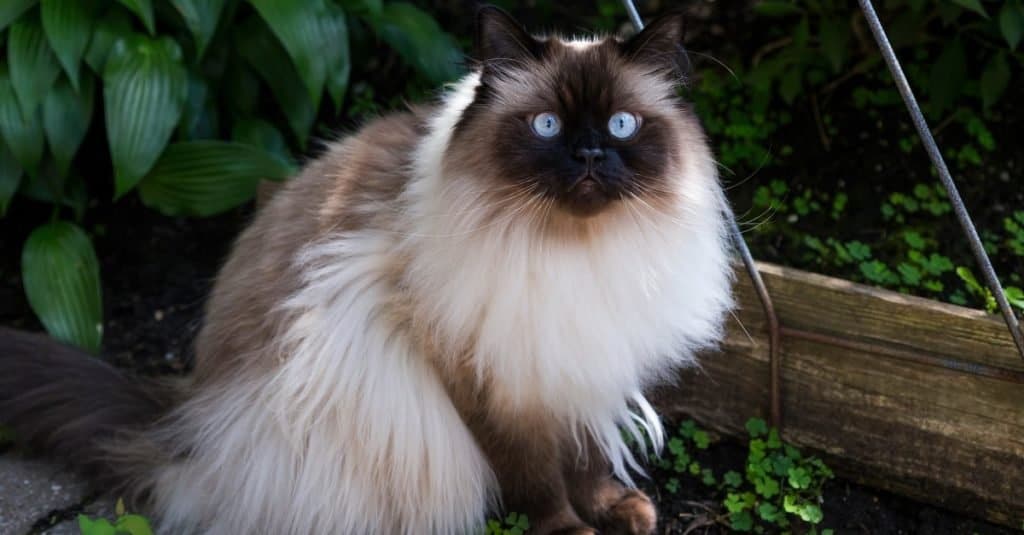
Himalayans are a type of Persian cat that was bred with a Siamese.
©Anne Richard/Shutterstock.com
Himalayans are intelligent and loving cats that enjoy curling up in their owner’s lap and hate being left alone for too long. Therefore, their brilliant minds need to be stimulated regularly, and if they don’t get the attention they need, they can become destructive.
In addition, Himalayans suffer from dental issues that could cause their gums to itch, making them prone to chewing anything, including cords. This can be avoided by brushing your fluff ball’s teeth at least three times a week. Hopefully, this will get your cat to stop chewing cords.
Bonus: What Essential Oils Keep Cats Off of Counters?

Using essential oils with citrus fragrances could help keep your cat off of counters and furniture.
©leonori/iStock via Getty Images
This question is popular among cat owners, who deal with cats that insist on walking on kitchen counters, tables, and other furniture they shouldn’t be on. One strategy to discourage this behavior is to strategically place essential oils in areas you don’t want your cat to be in.
Essential oils that could work well in this kind of experiment would be scents of citrus, peppermint, eucalyptus, or lime. Try not to place the oils where your cat could ingest them or step in them, as they will try to lick them off their paws.
The photo featured at the top of this post is © iStock.com/Sundry Photography
Sources
- The Spruce Pets, Available here: https://www.thesprucepets.com/cat-chewing-electrical-wires-554022
- Hepper, Available here: https://www.hepper.com/reasons-why-cats-chew-electrical-cords/
- Hills Pets, Available here: https://www.hillspet.com.au/cat-care/behavior-appearance/why-do-cats-eat-plastic
FAQs (Frequently Asked Questions)
How can I get my cat to stop chewing through cords?
Depending on the root cause of chewing, there are ways to try and curb this nasty habit. This includes changing their diet, keeping them active, reducing stress, wrapping cords in foil, and spraying menthol on wiring.
Do cats grow out of chewing wires?
Cats typically chew all types of objects when they are teething, but this behavior should stop once all their permanent teeth have arrived.
Why is my cat obsessed with chewing wires?
It’s hard to determine why cats are attracted to electrical cords and choose to chew on them. But, some people believe it’s just their playful nature and urge to attack anything that looks like a string or ribbon.
In addition, their curious natures usually get the better of them and sometimes land them in hot water.
Thank you for reading! Have some feedback for us? Contact the AZ Animals editorial team.






